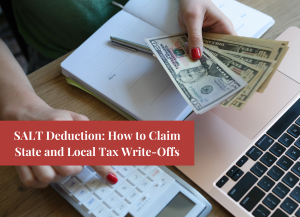Real estate can be a smart investment, but when tax season rolls around, knowing how to report your real estate taxes can get confusing. Whether you’re renting out a property, flipping houses, or selling a one-time investment, it’s crucial to understand which real estate tax forms you need. In this guide, we’ll demystify Schedules E, C, and D, making tax time less daunting for you, the savvy business owner.
Schedule E – Understanding Rental Property Reporting:
Let’s start with rental properties. If you own a property and rent it out, you’ll typically report your income and expenses on Schedule E. This form is for what we call “passive income.” Unlike a full-time job, where you actively earn money, rental income is considered passive because it doesn’t require your daily involvement.
Example: Imagine you own a duplex. You rent out both units and collect rent monthly. The money you make, minus expenses like mortgage interest and maintenance, gets reported on Schedule E. Simple, right?
Schedule C – Flipping Properties: A Business Venture:
Now, let’s talk about flipping properties. If you buy properties with the intention of renovating and selling them for a profit, this is where Schedule C comes into play. This is considered an active business, and the income you earn is subject to self-employment taxes.
Example: Suppose you bought an old house, fixed it up, and sold it for a tidy profit. That’s great! But remember, this income needs to be reported on Schedule C as it’s part of your flipping business.
The Smart Use of LLCs and S-Corporations in Property Flipping:
This is where things get interesting. If your property flipping business is run through an LLC treated as an S-Corporation, you might find some tax advantages. Profits from the S-Corp are subject to ordinary taxes but can offer savings on self-employment taxes. But, there’s a catch. This setup works best when the property is registered under the LLC’s name.
Example: You have an LLC for your property flipping business. The properties you flip are in the LLC’s name, not your personal name. This way, the profits are reported under the S-Corp, potentially saving you money on self-employment taxes. Smart, right?
Related Article: From LLCs to Corporations
Great! Continuing from where we left off:
Schedule D – Capital Gains and One-Time Sales:
When you sell a property that isn’t part of your regular business, like a one-time investment or maybe your personal home, Schedule D is your go-to. This form is for reporting capital gains or losses. The duration you held the property determines if it’s a short-term or long-term gain, which affects your tax rate.
Example: Let’s say you sold a vacation home you’ve owned for three years. The profit from this sale is a long-term capital gain, reported on Schedule D. But if you sold a property you held for only eight months, that’s a short-term gain, with different tax implications.
Special Case: Selling Your Primary Residence
If you’re selling your primary residence, and you’ve lived in it for at least two of the past five years, you might qualify for a capital gains exclusion. This means you could keep more of the profit without paying the real estate taxes on it. Remember, this only applies to your primary home, not investment properties.
Comparative Analysis: Making Sense of It All
So, to recap: Schedule E is for passive rental income, Schedule C is for active business income from flipping properties, and Schedule D is for one-time property sales and capital gains. Understanding which schedule to use depends on your specific situation and how you’re involved with the property. When in doubt, consulting with a tax professional is always a wise move.
Real estate offers many opportunities, but it also comes with its share of tax responsibilities. Knowing whether to use Schedule E, C, or D can make a big difference in your real estate tax obligations. By staying informed and organized, you can navigate tax season with confidence.
Still have questions? Or perhaps you’re looking for personalized advice on your real estate taxes or investments? Don’t hesitate to reach out to us. Our team is here to help you with all your tax and accounting needs, ensuring you make the most out of your real estate ventures.




